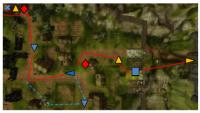


Affective level design for a role-playing videogame evaluated by a brain–computer interface and machine learning methods
Abstract: Game science has become a research field, which attracts industry attention due to a worldwide rich sell-market. To understand the player experience, concepts like flow or boredom mental states require formalization and empirical investigation, taking advantage of the objective data that psychophysiological methods like electroencephalography (EEG) can provide. This work studies the affective ludology and shows two different game levels for Neverwinter Nights 2 developed with the aim to manipulate emotions; two sets of affective design guidelines are presented, with a rigorous formalization that considers the characteristics of role-playing genre and its specific gameplay. An empirical investigation with a brain–computer interface headset has been conducted: by extracting numerical data features, machine learning techniques classify the different activities of the gaming sessions (task and events) to verify if their design differentiation coincides with the affective one. The observed results, also supported by subjective questionnaires data, confirm the goodness of the proposed guidelines, suggesting that this evaluation methodology could be extended to other evaluation tasks.
Citation:
Balducci, Fabrizio; Grana, Costantino; Cucchiara, Rita "Affective level design for a role-playing videogame evaluated by a brain–computer interface and machine learning methods" THE VISUAL COMPUTER, vol. 33, pp. 413 -427 , 2017 DOI: 10.1007/s00371-016-1320-2
not available
Paper download:
- Author version:

- DOI: 10.1007/s00371-016-1320-2